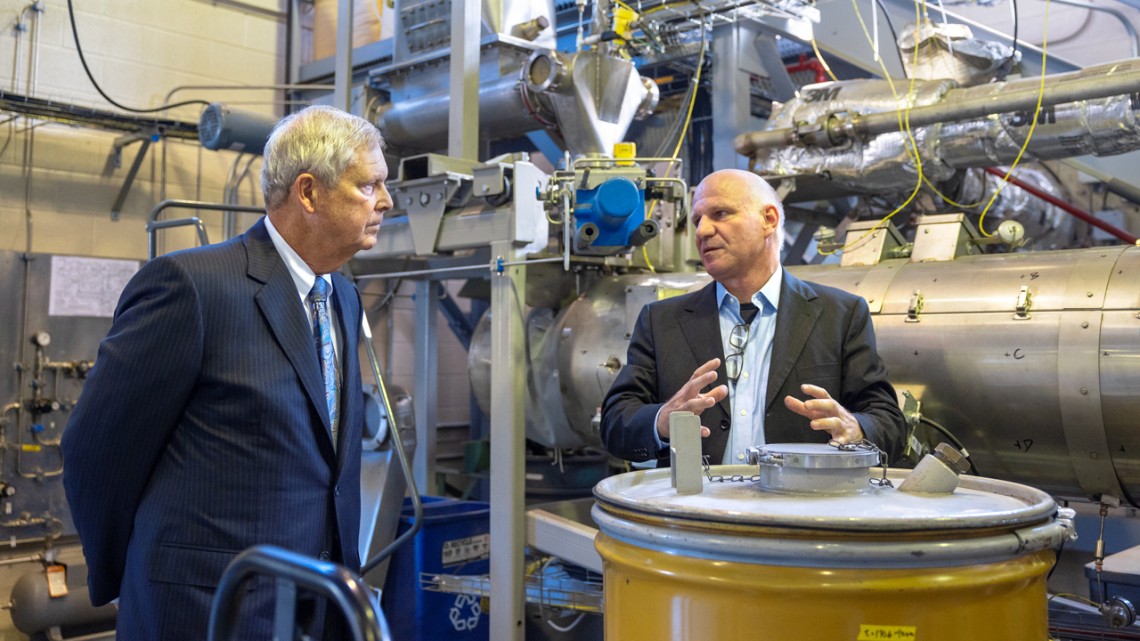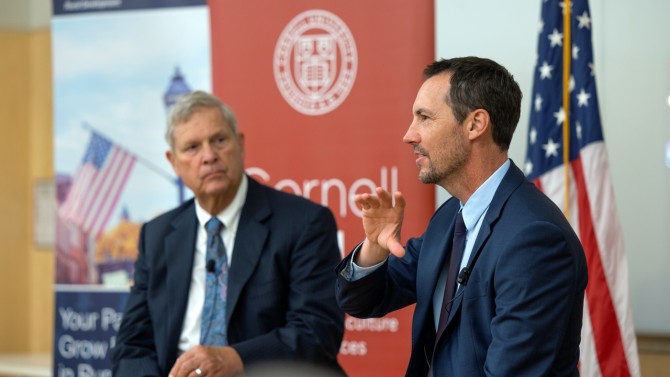
Tom Vilsack, U.S. secretary of agriculture, left, and Professor Johannes Lehmann at Cornell's pyrolysis kiln, during Vilsack's Sept. 6 visit to campus.
Ag secretary visit highlights climate-smart opportunities
By Elizabeth Myers
U.S. Agriculture Secretary Tom Vilsack visited the College of Agriculture and Life Sciences (CALS) on Sept. 6 to discuss research, teaching and extension programs focused on empowering farmers and finding new climate solutions that are equitable and science-based.
“What can we do to slow down and reverse the loss of farms, to allow American agriculture to lead the world in climate-smart practices, and to create the opportunity for small- and mid-sized farming operations to prosper?” Vilsack asked a Stocking Hall audience that included more than 150 students and faculty, as well as New York State Agricultural Commissioner Richard Ball, state Sen. Lea Webb (D-52nd District) and state Assemblymember Anna Kelles (D-125th District).
The USDA is committed to supporting innovative programs and cutting-edge solutions that make American farmers more productive, profitable and resilient, Vilsack said, focusing especially on federal priorities that can strengthen farm and food businesses, increase producer income and bolster the food supply chain.
“This is a future we are actively working to support and help design here at CALS with our college’s Roadmap to 2050,” said Benjamin Z. Houlton, the Ronald P. Lynch Dean of CALS and a professor of ecology and evolutionary biology, and of global development. “As our experts are acutely aware, there is nothing more connective than our agrifood system, nothing more important to our past, present and future. It all starts right here in New York state, and goes to other states, the nation and the rest of the world, and back again.”
During the hourlong discussion, Vilsack emphasized the need for solutions that simultaneously reduce greenhouse gas emissions and solve the challenges farmers face. “When you’re looking at practices that we’re encouraging on the climate-smart side, some of it involves the conversion of agricultural waste into something more valuable,” said Vilsack, whose morning at CALS began at Cornell’s pyrolysis kiln, which converts biomass and waste to biochar. The technology could potentially benefit farmers financially while reducing greenhouse gas emissions, supporting agriculture’s role in science-based strategies to mitigate climate change.
Local and regional food systems offer another opportunity to help small and mid-sized farms prosper, Vilsack said, mentioning farm-to-school programs as examples that allow growers to negotiate selling their products directly to nearby schools. “If we do this right – if we encourage farmers to understand the importance of this and work with local school districts – it very well could be that schools will pay less and farmers will get paid more. What’s not to like about that?”
During a Q&A session, Vilsack was asked about the United States’ role in addressing the global challenge of food security and sustainability in the context of climate change. “As we learn what works, we not only have to share it with our farmers, but we also need to share it with world farmers,” he said.
Houlton cited the college’s Hubert H. Humprey Fellowship Program as just one example of global dialogue: “We bring in people from countries that are dealing with some of the really intense effects of climate change right now, some of which we’re starting to see here, and we exchange knowledge.”
Vilsack’s visit to CALS launched a planned series of similar conversations at land-grant institutions nationwide. “I picked Cornell as the first land-grant university to make this presentation for a single reason: You all are leaders among land-grants. You understand the significance and power of your reach. When Cornell is doing something, it’s not unusual to see other land-grant universities embrace it.”
The event was Vilsack’s second visit to Cornell’s Ithaca campus; the first was in 2014, when he met with faculty to learn about solutions regarding dairy, nutrition and climate change.
Elizabeth Myers is the senior writer for the College of Agriculture and Life Sciences.
Media Contact
Get Cornell news delivered right to your inbox.
Subscribe

